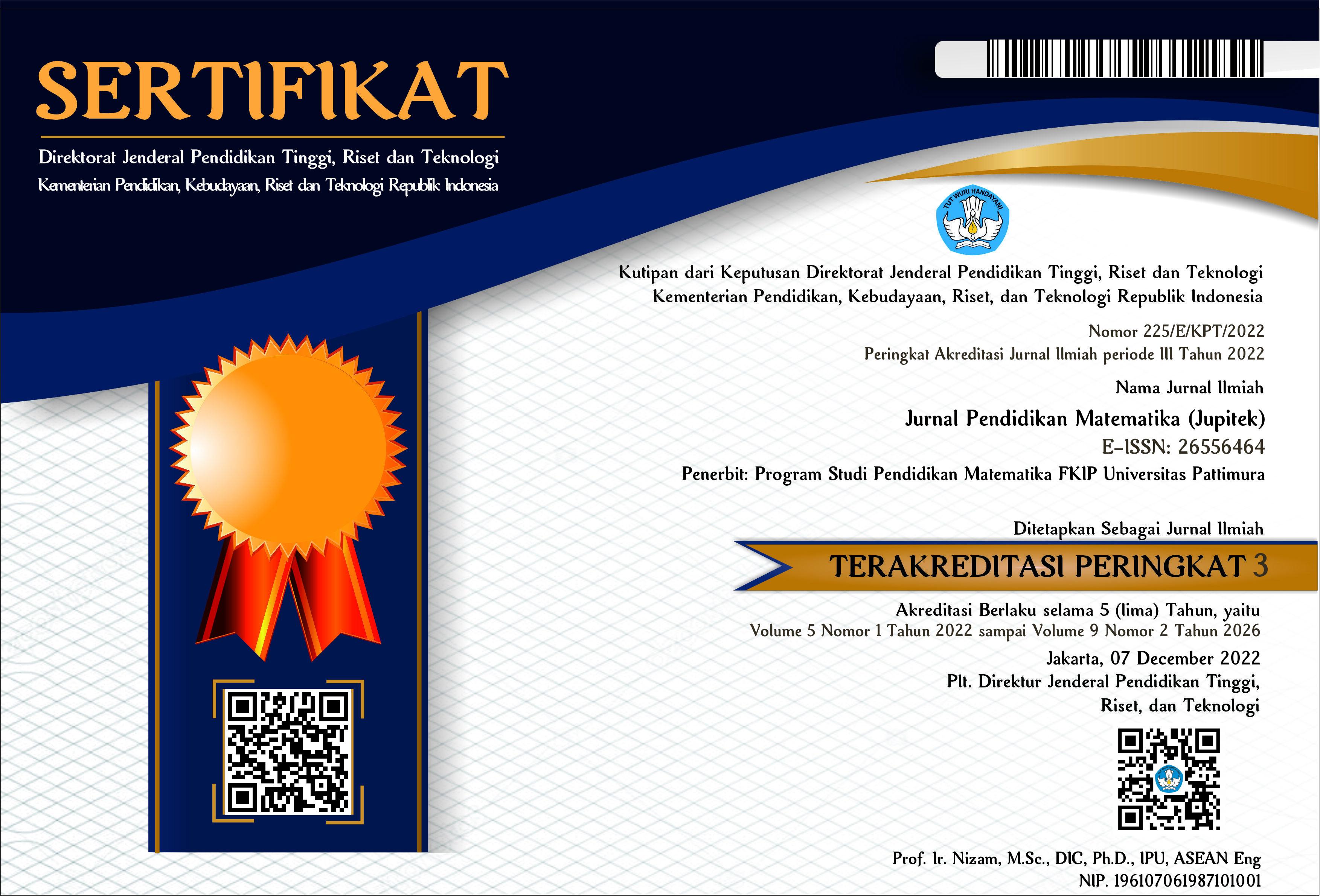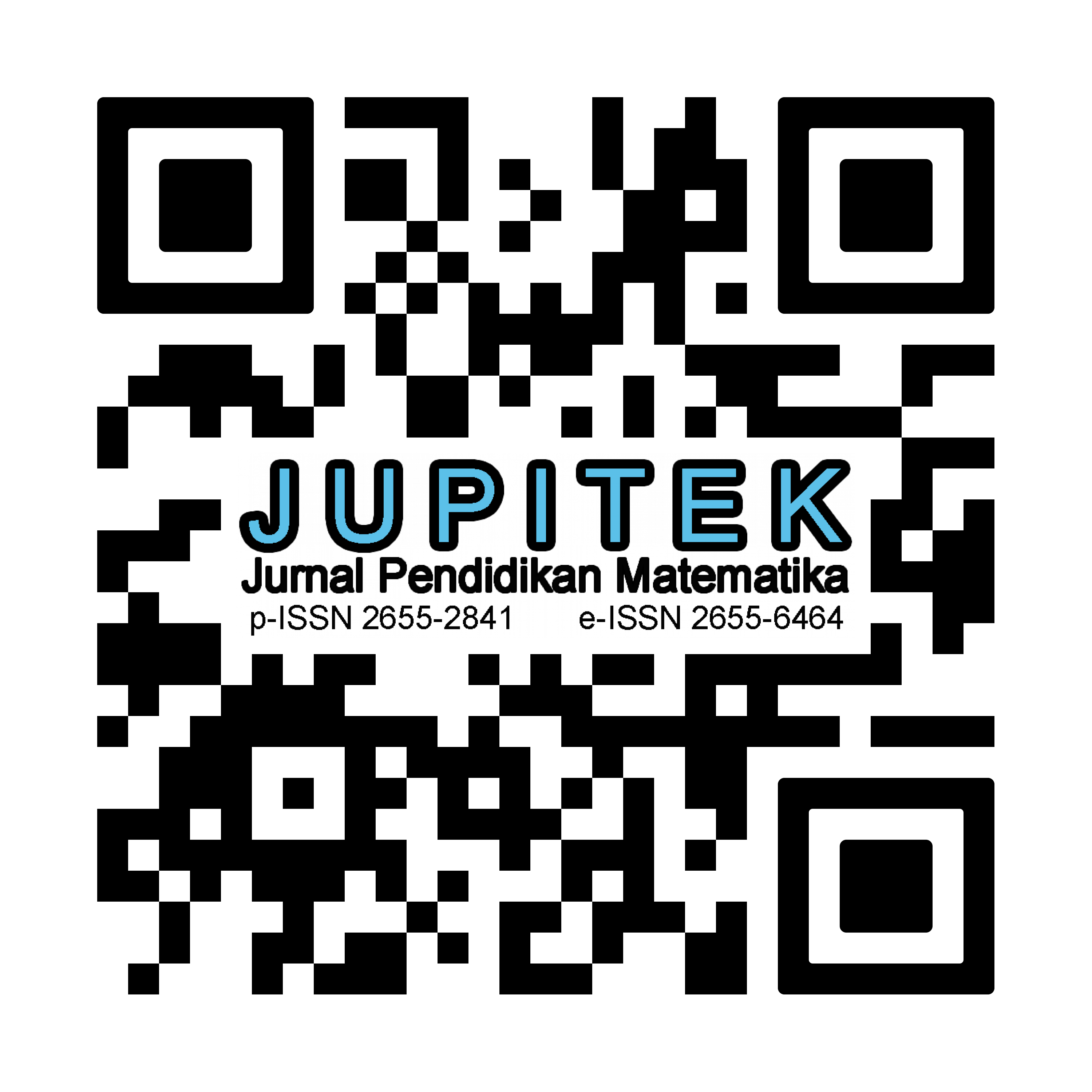THE THINKING PROCESS OF CHILDREN WITH SPECIAL NEEDS (SLOW LEARNER) IN INCLUSION CLASSES IN SOLVING MATHEMATICAL PROBLEM
Abstract
This study aims to describe the thought process of one slow learn child in an inclusion class in solving mathematical problems structured according to Polya’s stages. This type of research is a case study. The result of this study state that in the stage of understanding the subject’s problem only remembers information at the end of the problem because of limited memory. In the stage of making a problem solving plan, the subject translate the problem into mathematical symbols based on the sequence of activities in the problem. In the stage of implementing the problem solving plan, the subject can solve existing problem but does not have confidence in the truth of the final answer obtained. In the stage of checking again, the subject does not recheck each step of completion or the final answer obtained because the subject considers the work to have been completed
Downloads
References
Borah, R. R. 2013. Slow Learner: Role of Teachers and Guardians in Honing their Hidden Skill. International Journal of Education Planning & Administration. pp. 139-143
Chauhan, S. 2011. Slow Learner: Their Psychology and Educational Programmes. International Journal of Multidisciplinary Research. pp. 279-289
Delphie, Bandi. 2012. Pembelajaran Anak Tunagrahita (Suatu Pengantar Dalam Pendidikan Inklusi). Bandung: Refika Aditama.
Garnida, D. 2015. Pengantar Pendidikan Inklusif. Bandung: PT. Refika Aditama.
Kusumawati, N. 2010. Peningkatan Kemampuan Pemahaman, Pemecahan Masalah, dan Disposisi Matematis Siswa SMP Melalui Pendekatan Pendidikan Matematika Realistik. Disertasi Tidak Dipublikasikan. FPMIPA UPI.
Malik, N. I, Rehman, G. Hanif, R. 2012. Effect of Academic Interventions on the Developmental Skill of Slow Learners. Pakistan Journal of Psychological Research, Vol 27 (1). Hlm. Pp. 135-151
Najafi, M., Motaghi, Z., Nasrabadi, H. B., Heshi, K. N. 2016. "Debate" learning method and its implications for the formal education system. Educational Research and Reviews. Vol. 11(6), pp. 211-218
Ratna, Y & Dhany, H. 2011. Teori-teori Dasar Psikologi Pendidikan. Jakarta: Prestasi Pustaka.
Reddy, G. L., Ramar, R., & Kusuma, A. 2006. Slow Learner: Their Psychology and Instruction. New Delhi: Discovery Publishing House.
Schoenfeld, Alan H. 2013. Mathematical Problem Solving. Orlando: Academic Press
Schuck, S., & Grootenboer, P. 2004. Affective issues in mathematics education. In B. Perry, G.Anthony, & C. Diezmann (Eds.), Research in mathematics education in Australasia (pp. 53-74). Flaxton, Qld: Post Pressed.
Soedjadi, R. 2010. Kiat Pendidikan Matematika di Indonesia: Konstatasi Keadaan Masa Kini Menuju Harapan Masa Depan. Jakarta: Dirjen Dikti Depdiknas. Hal.11
Subanji. 2016. Proses Berpikir Siswa Berdasarkan Kerangka Kerja Mason. Jurnal Pendidikan: Teori Penelitian dan Pengembangan. Hal. 297-313
Supriadi, D, dkk. 2015. Analisis Proses Berpikir Siswa Dalam Memecahkan Masalah Matematika Berdasarkan Langkah Polya Ditinjau Dari Kecerdasan Emosional Siswa Kelas Viii Smp Al Azhar Syifa Budi Tahun Pelajaran 2013/2014. Jurnal Elektronik Pembelajaran Matematika. Vol.3, No.2, hal 204-214, April 2015. http://jurnal.fkip.uns.ac.id/
Syafitri, T. I. 2016. Proses Berpikir Siswa Tunanetra Dalam Menyelesaikan Masalah Matematika Di UPT SMPLBN Kota Pasuruan. Tesis Tidak Dipublikasikan. PPs Universitas Negeri Malang
Triani, N., & Amir 2013. Pendidikan Anak Berkebutuhan Khusus Lamban Belajar (Slow Learner). Jakarta: Luxima.
Copyright (c) 2020 Susana Labuem

This work is licensed under a Creative Commons Attribution-NonCommercial-ShareAlike 4.0 International License.
License and Copyright Agreement
By submitting a manuscript to Jurnal Pendidikan Matematika (JUPITEK), the author(s) certify and agree to the following terms:
- Originality and Authority: The submitting author is authorized by all co-authors to enter into this agreement. The manuscript describes original work that has not been published previously in a peer-reviewed journal, nor is it under consideration for publication elsewhere.
- Approval: Its publication has been approved by all author(s) and by the responsible authorities of the institutions where the work was carried out.
- Rights: The authors secure the right to reproduce any material that has already been published or copyrighted elsewhere.
- Licensing and Copyright: Authors retain the copyright to their work.
- License Grant: The authors grant Jurnal Pendidikan Matematika (JUPITEK) the right of first publication, with the work simultaneously licensed under the Creative Commons Attribution-NonCommercial-ShareAlike 4.0 International (CC BY-NC-SA 4.0).
- Self-Archiving: Authors are permitted and encouraged to deposit the published version of their article in institutional repositories, on their personal websites, and other academic platforms, with proper acknowledgment of its initial publication in Jurnal Pendidikan Matematika (JUPITEK).






.png)


